Презентация business letter formats

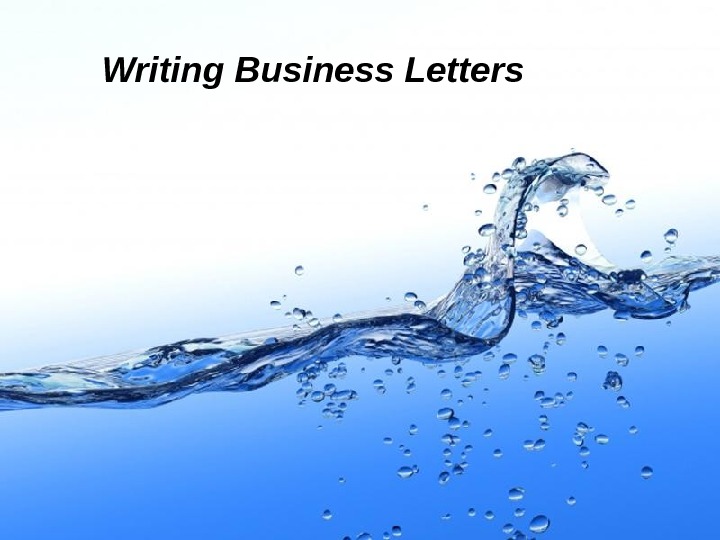
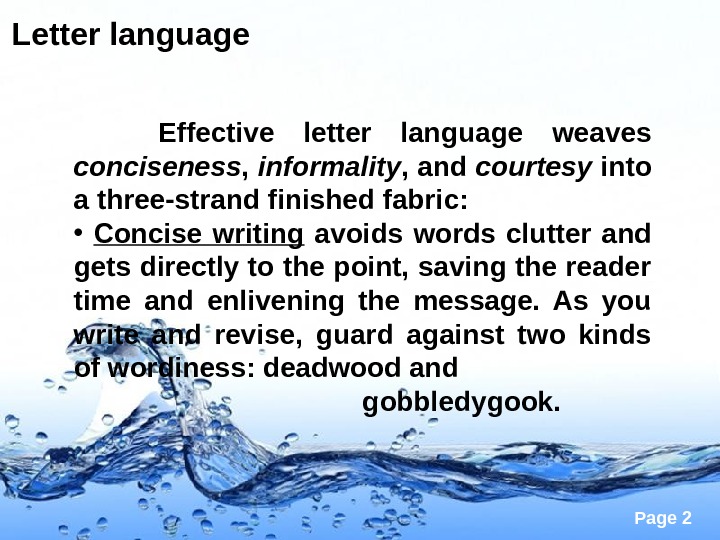
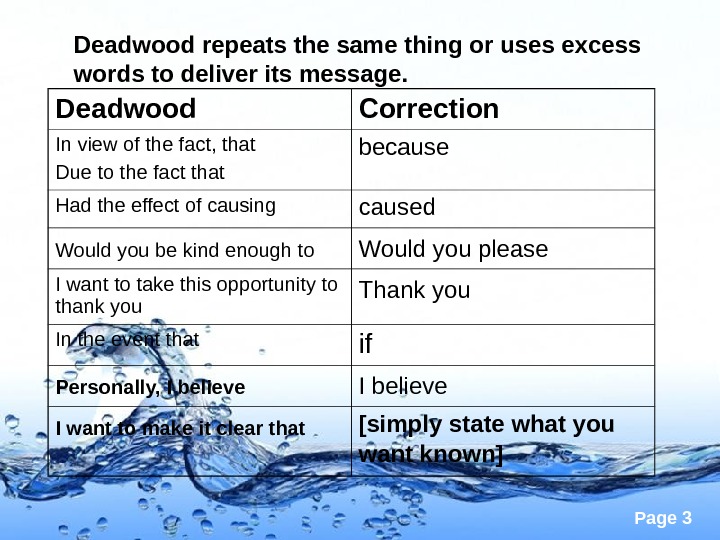
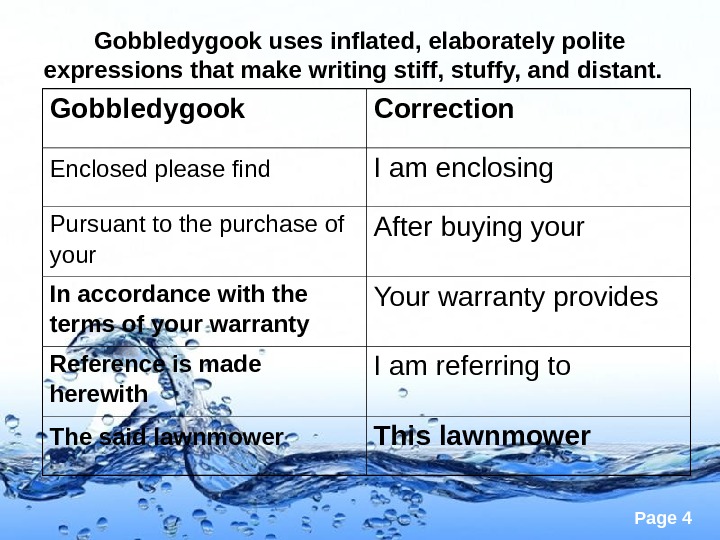
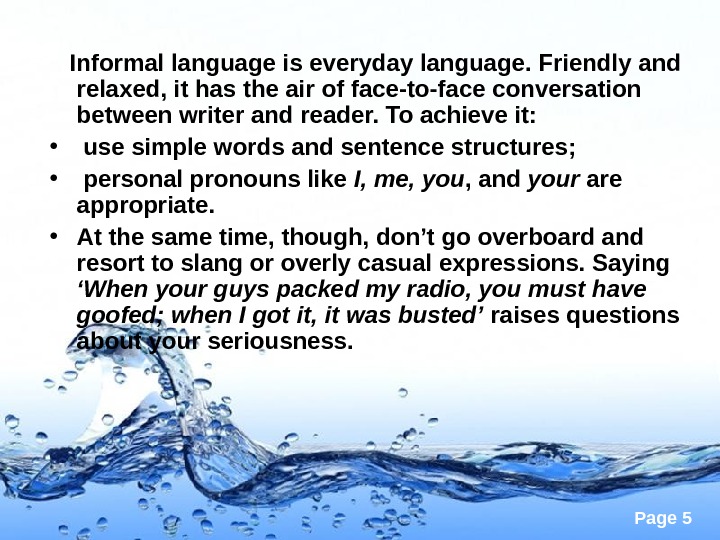
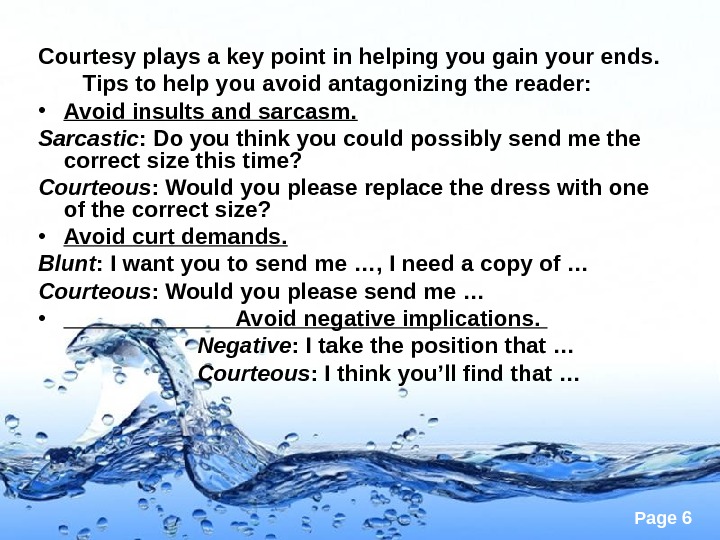
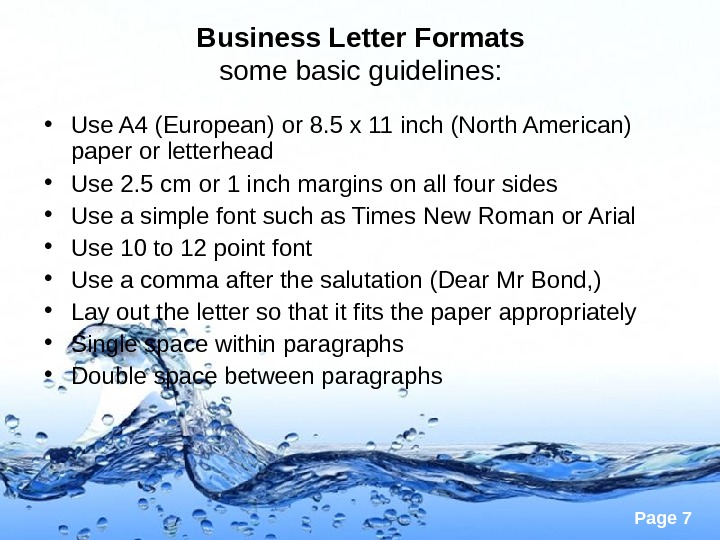
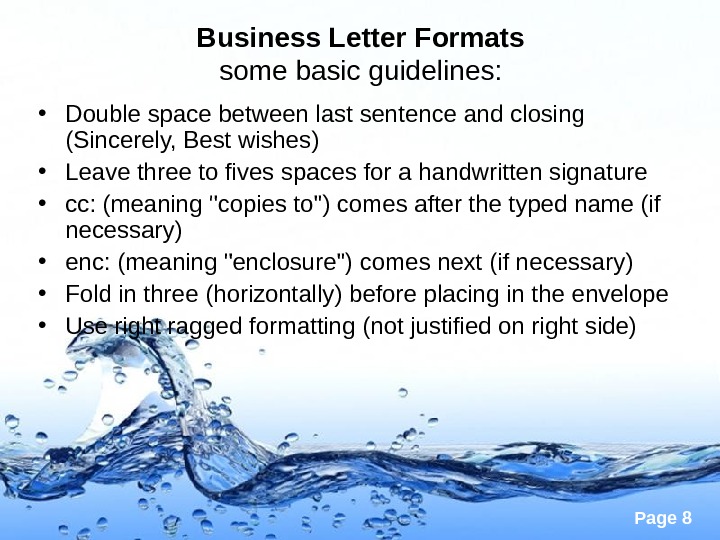
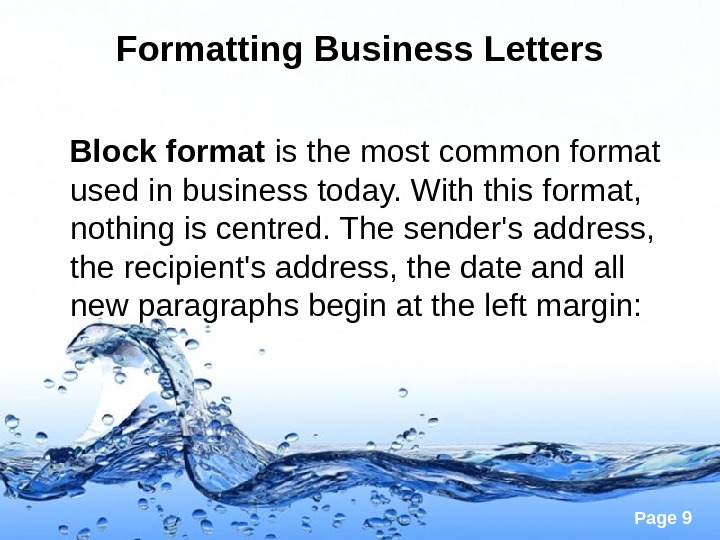
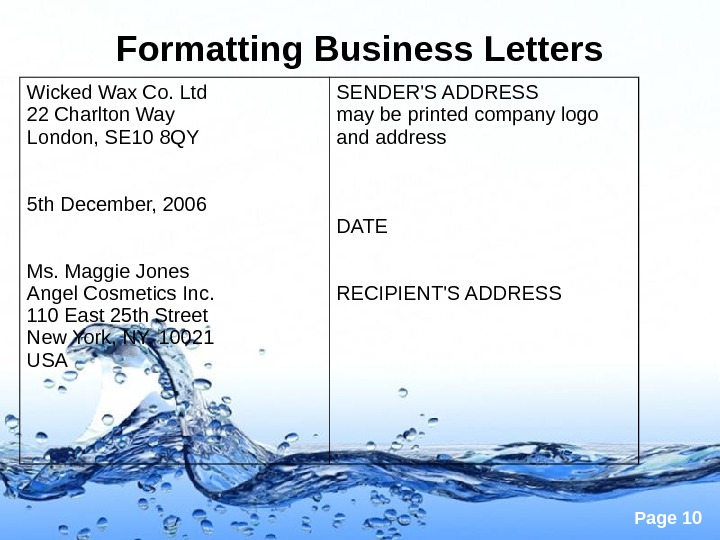
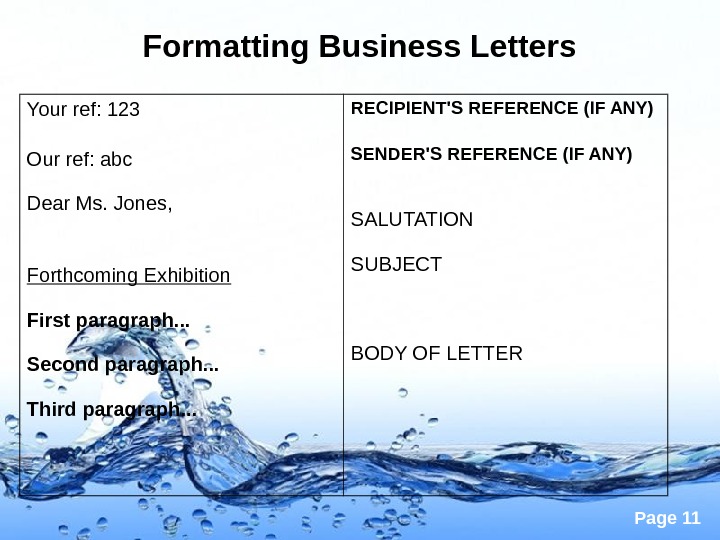
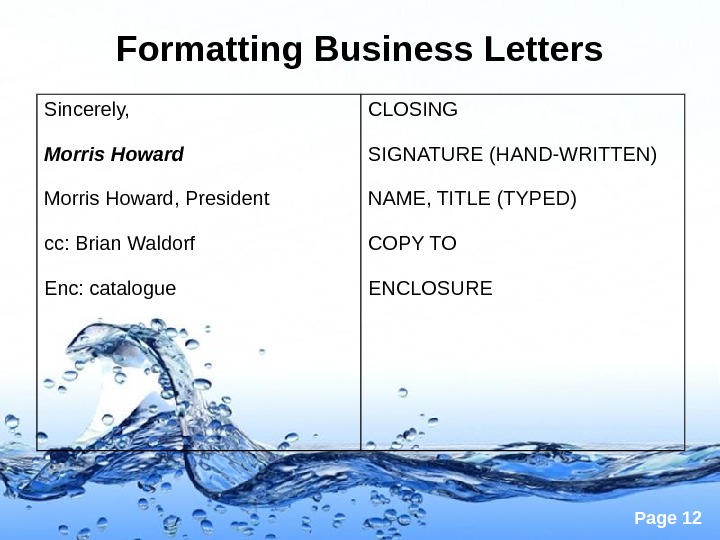
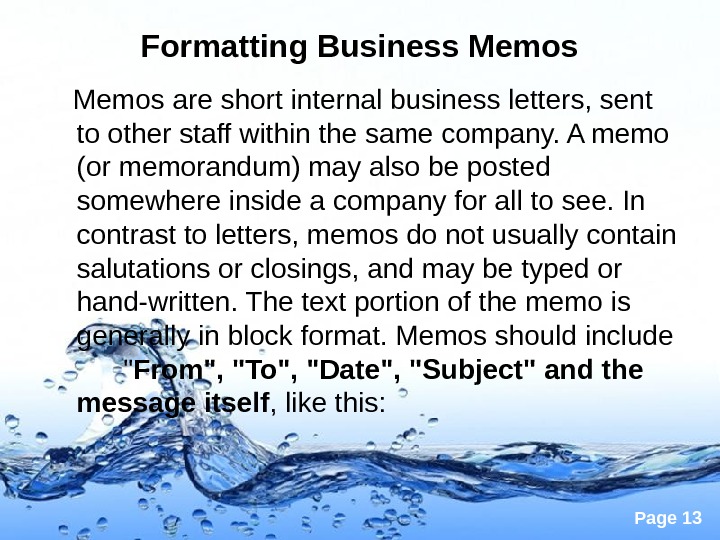
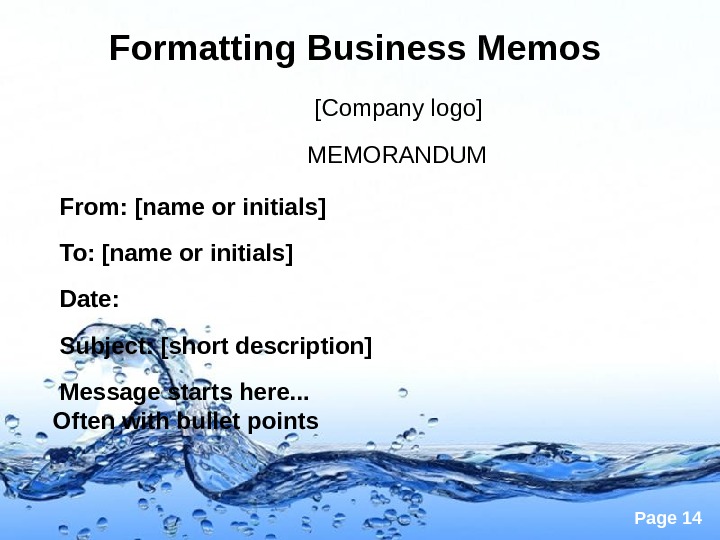
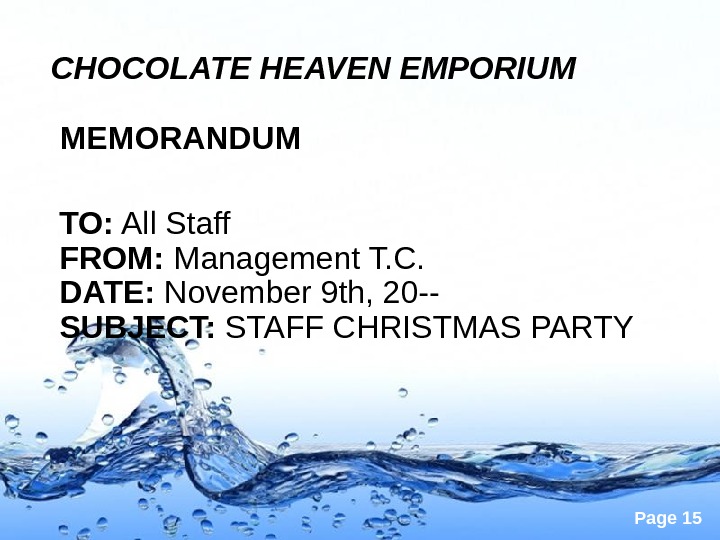
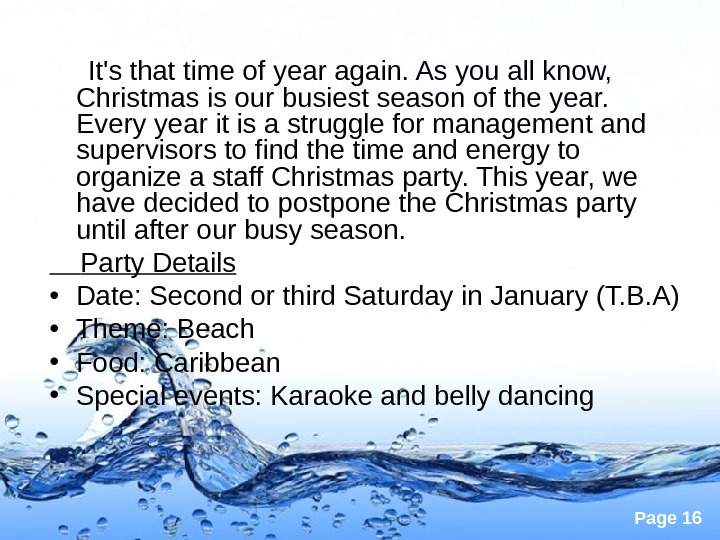
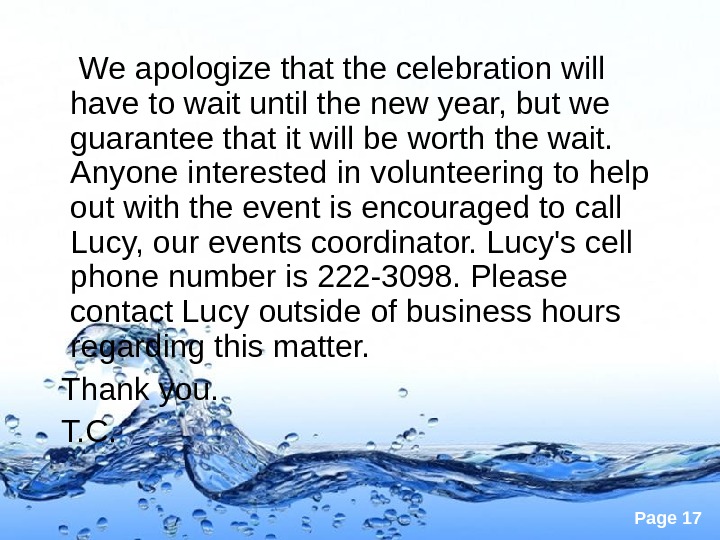
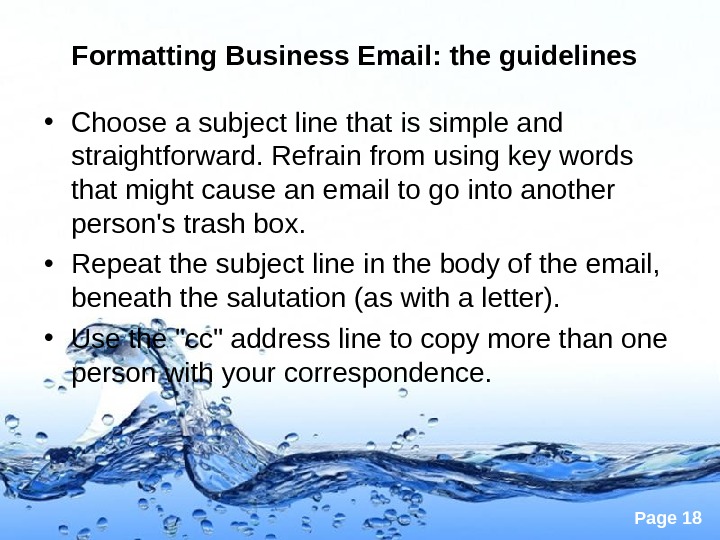
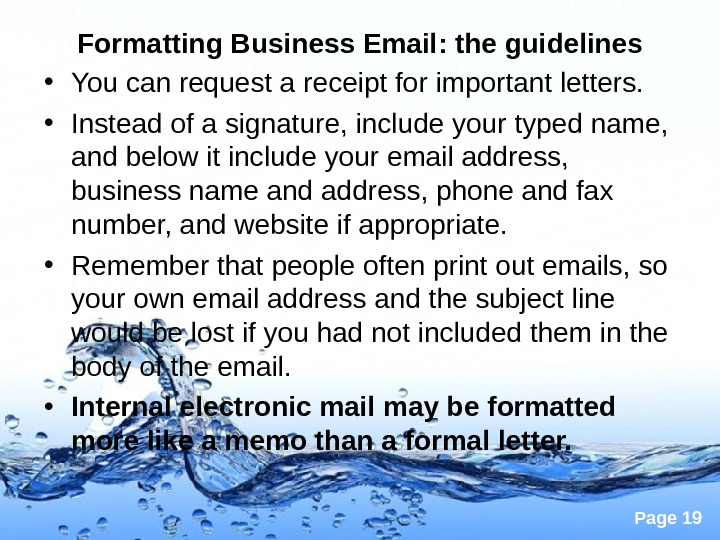
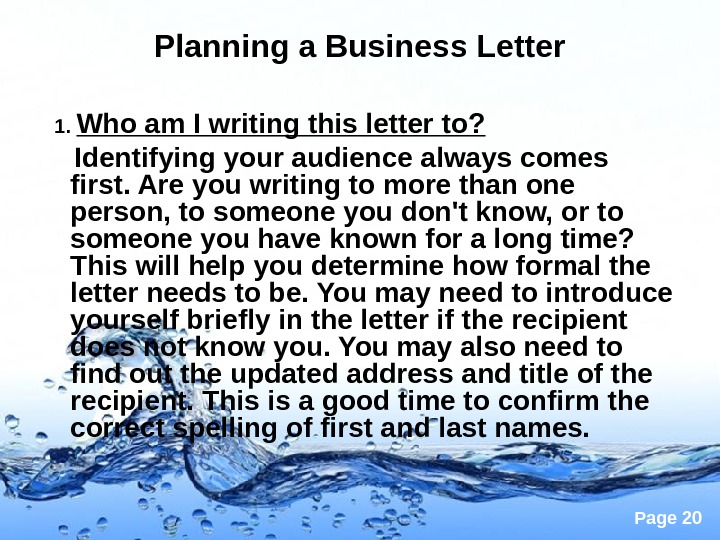
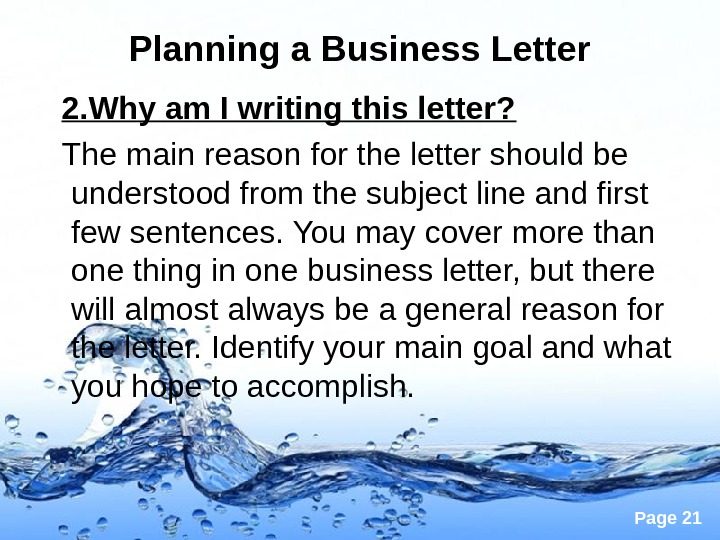
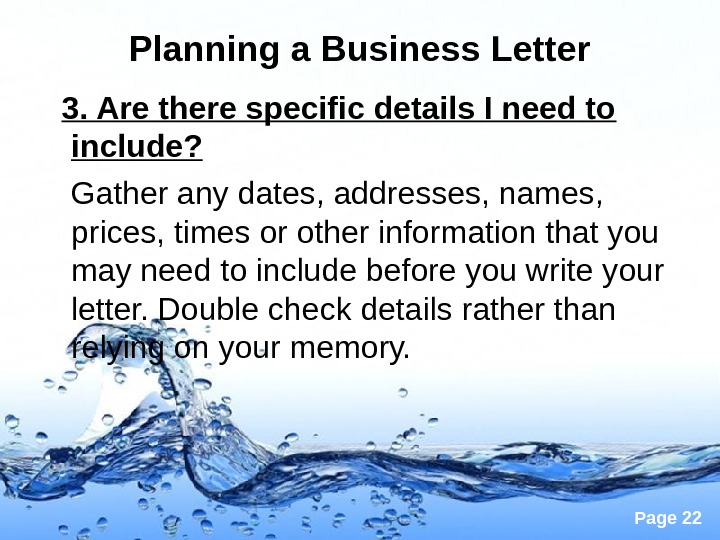
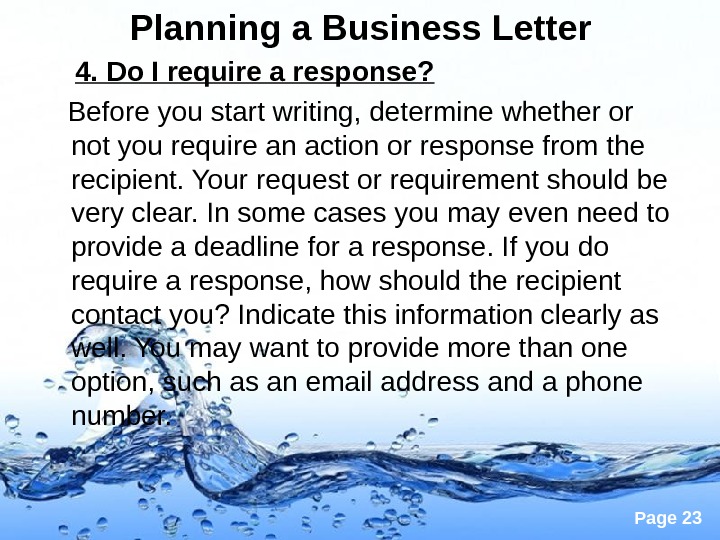
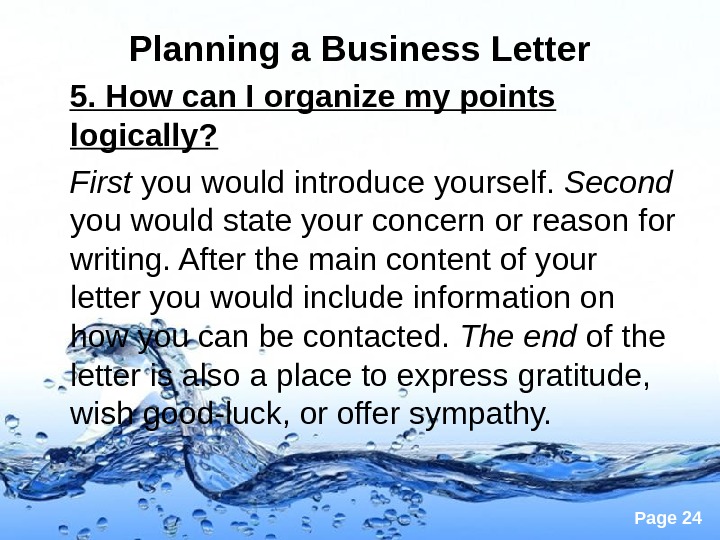
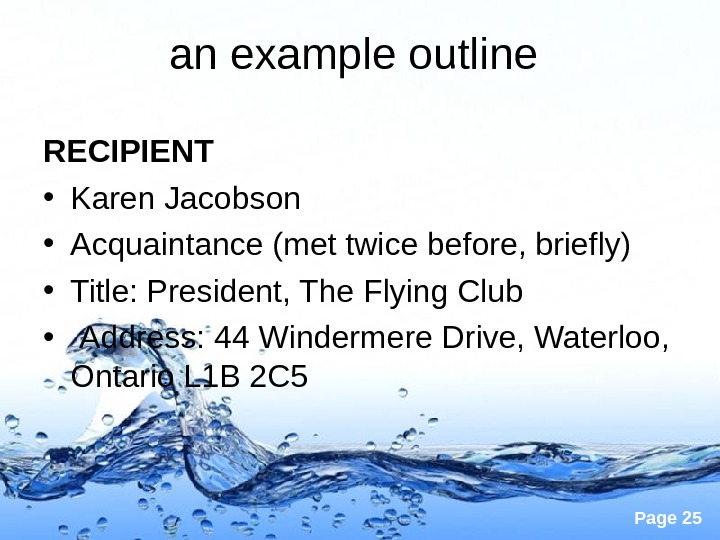
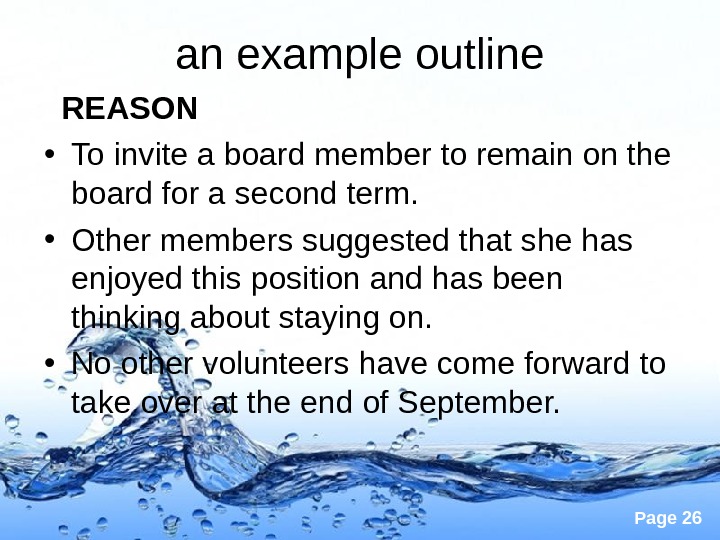
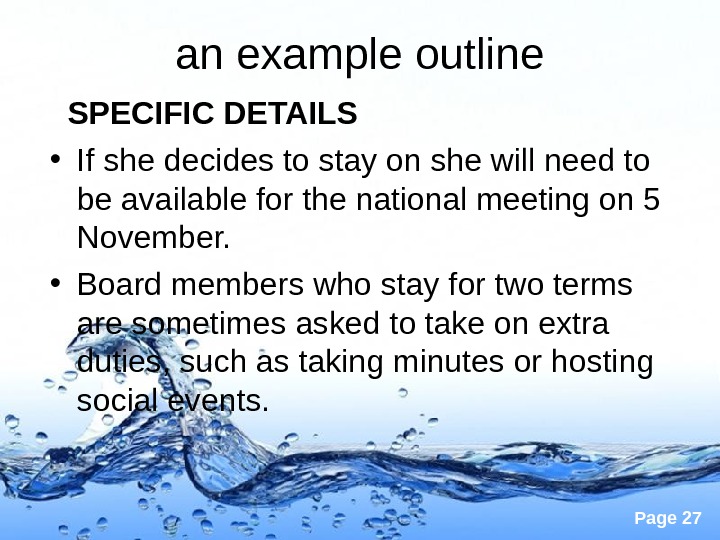
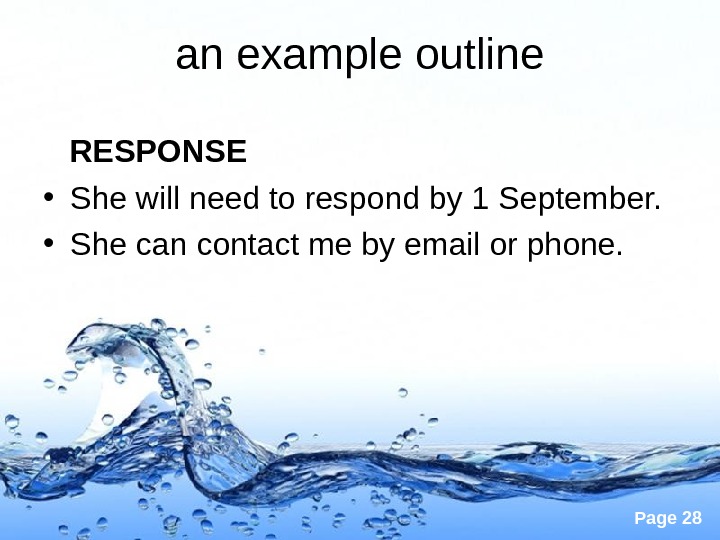
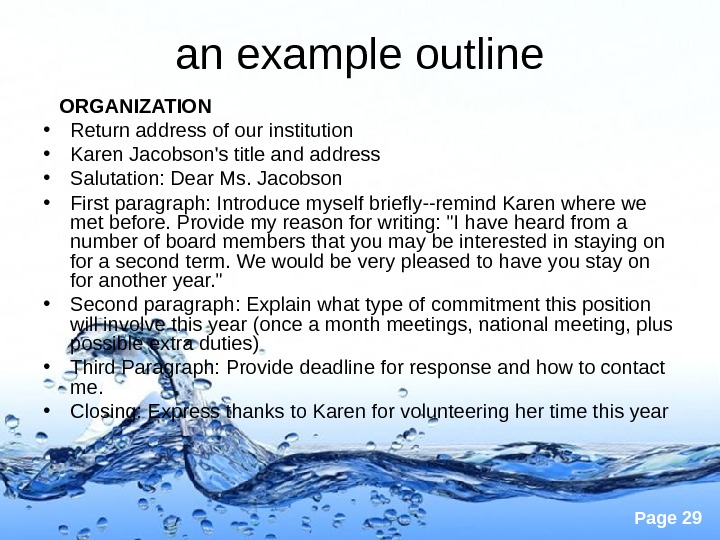
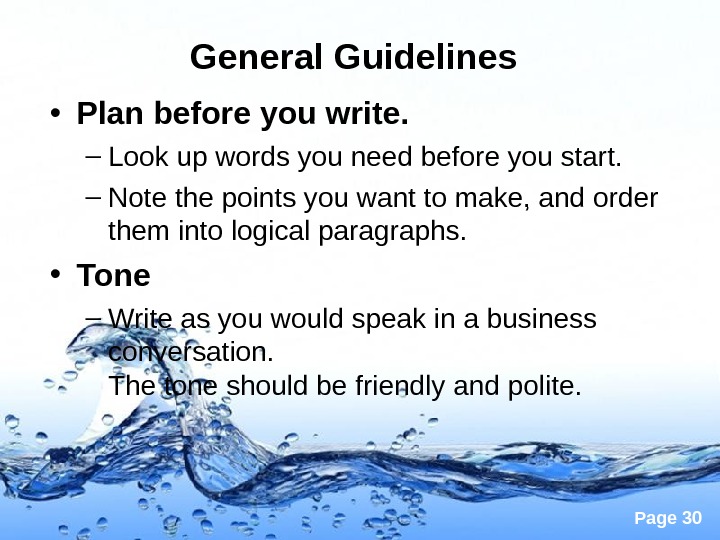
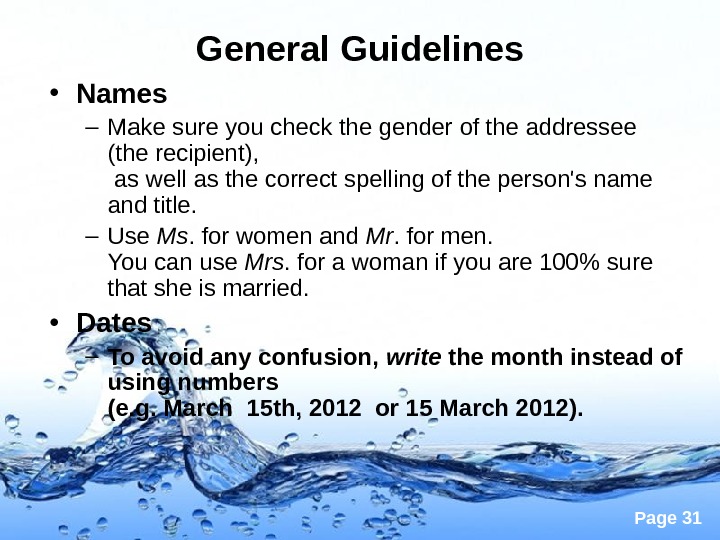
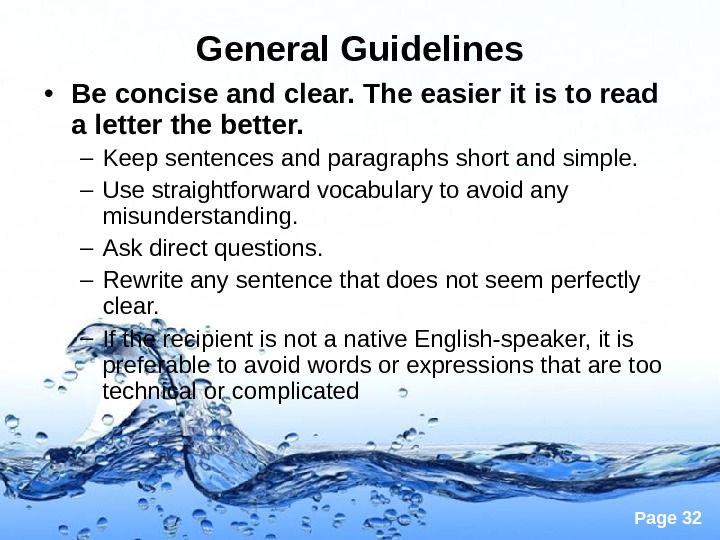
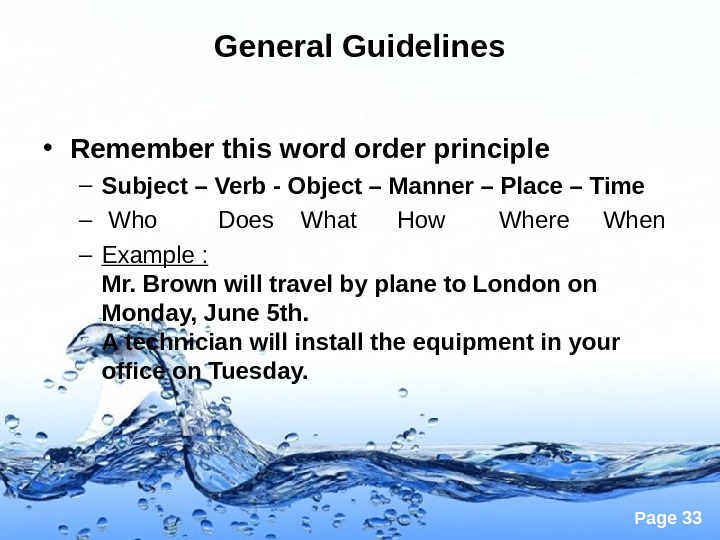
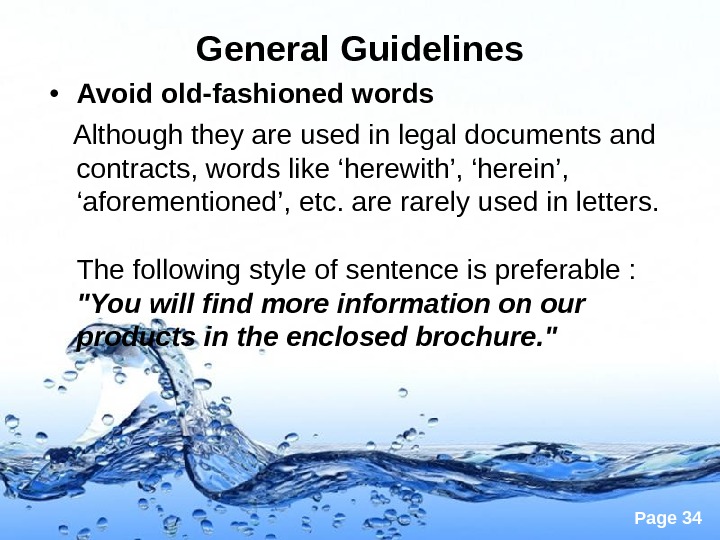
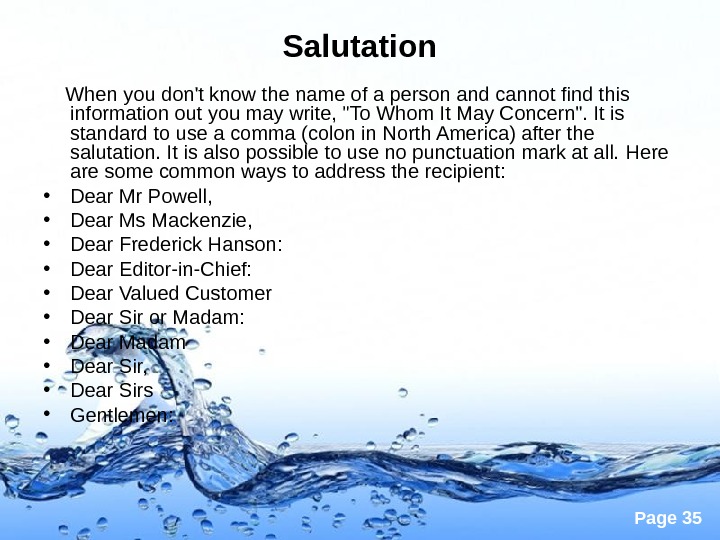
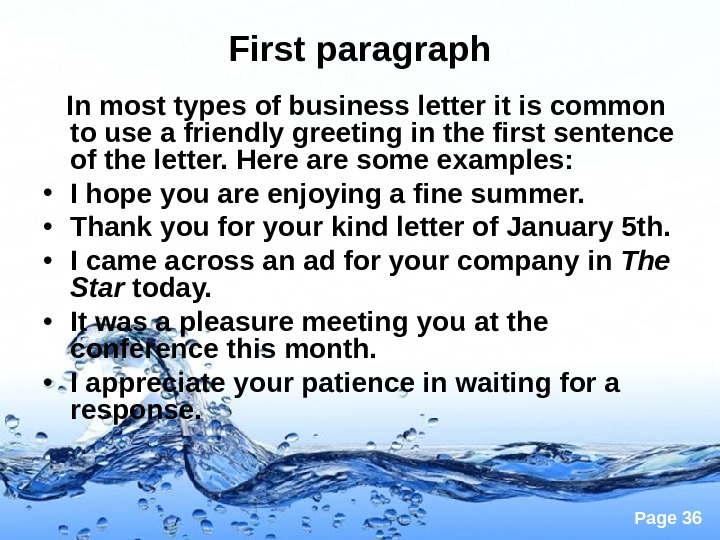
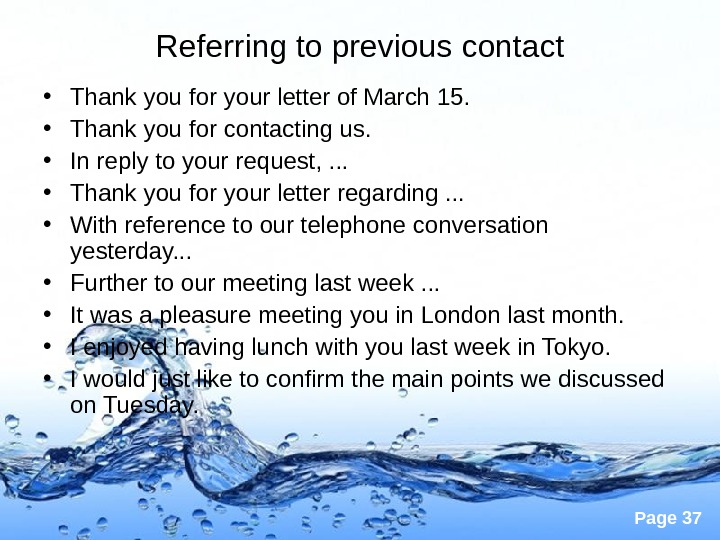
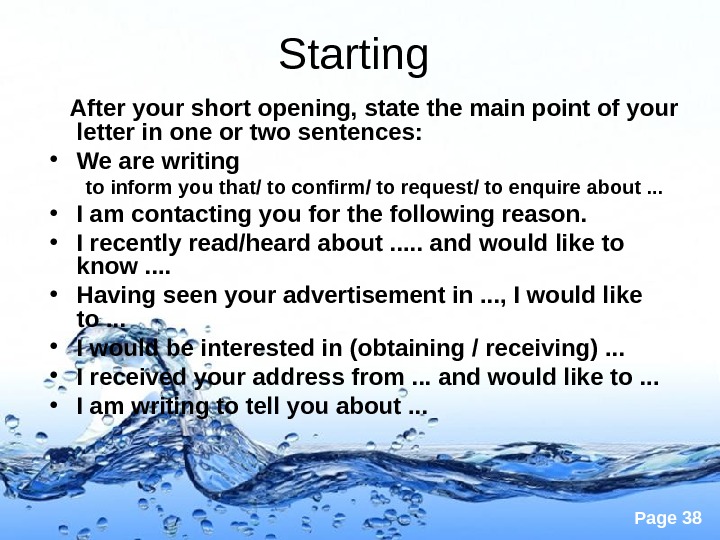
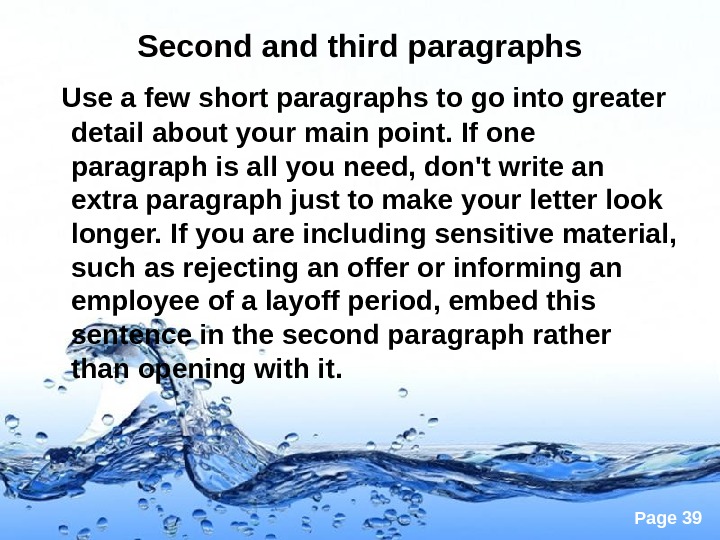
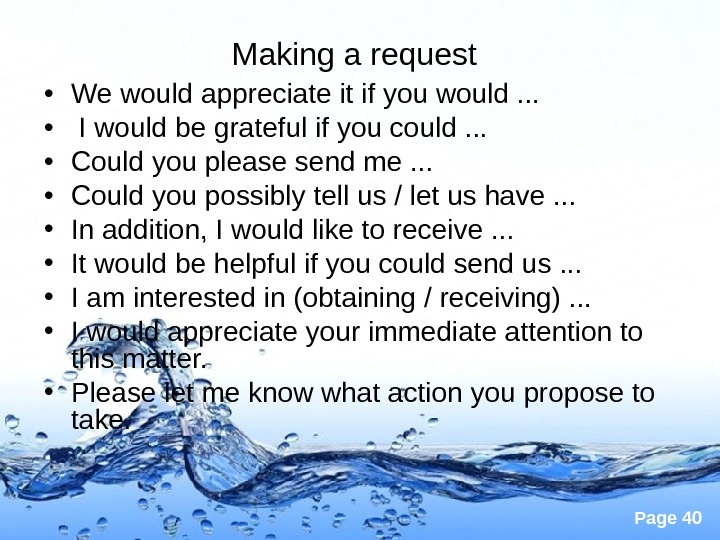
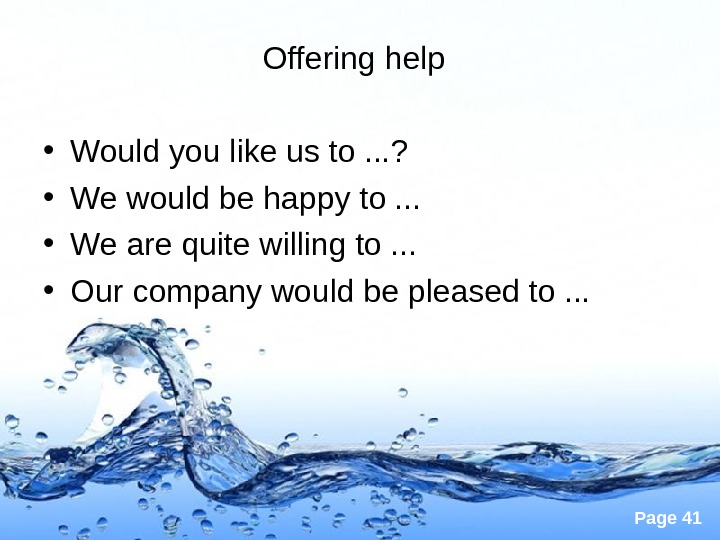
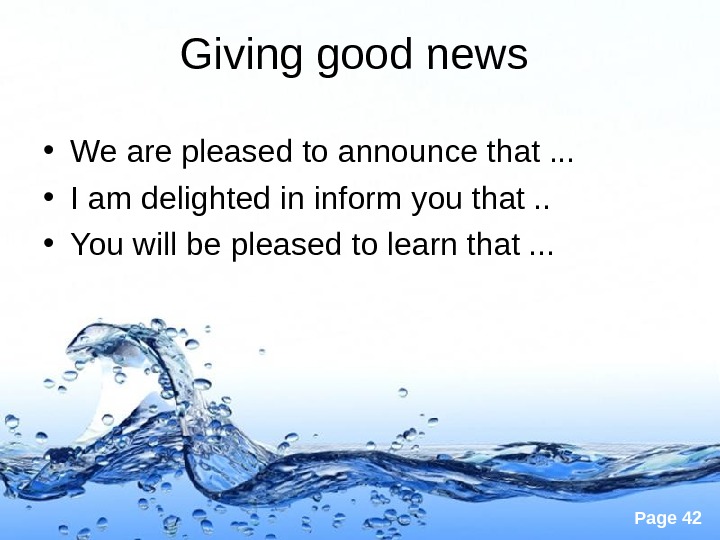
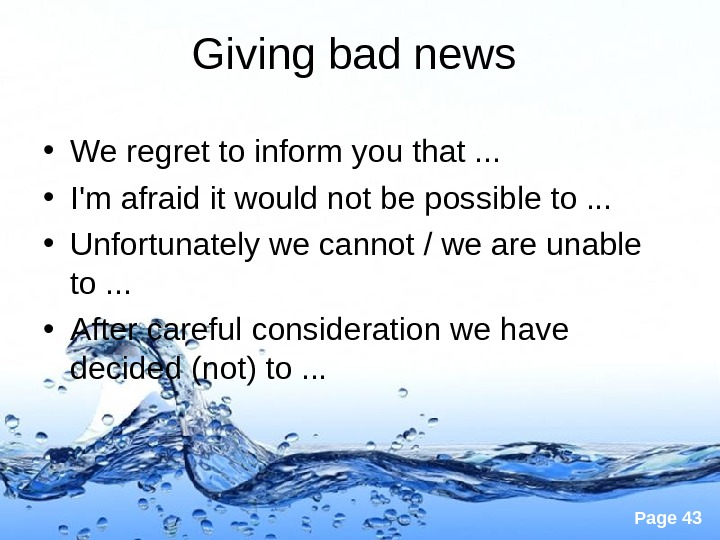
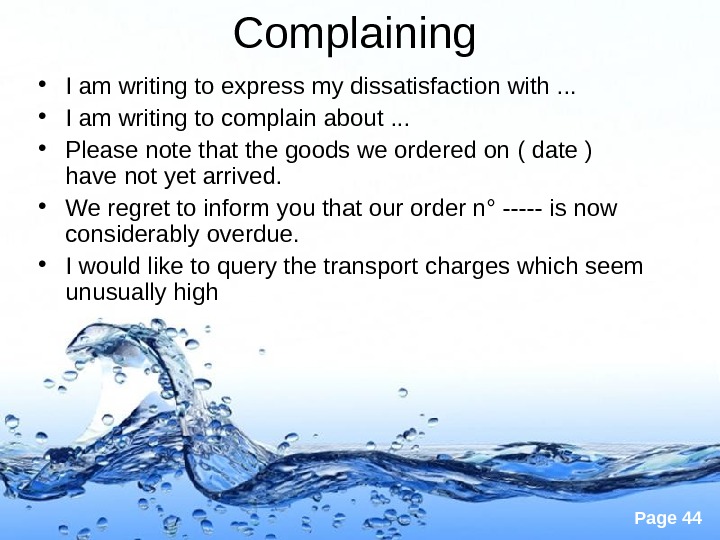
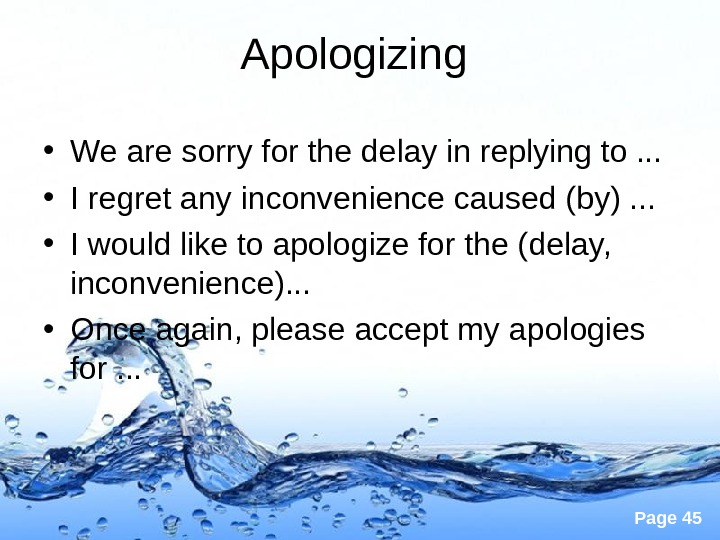
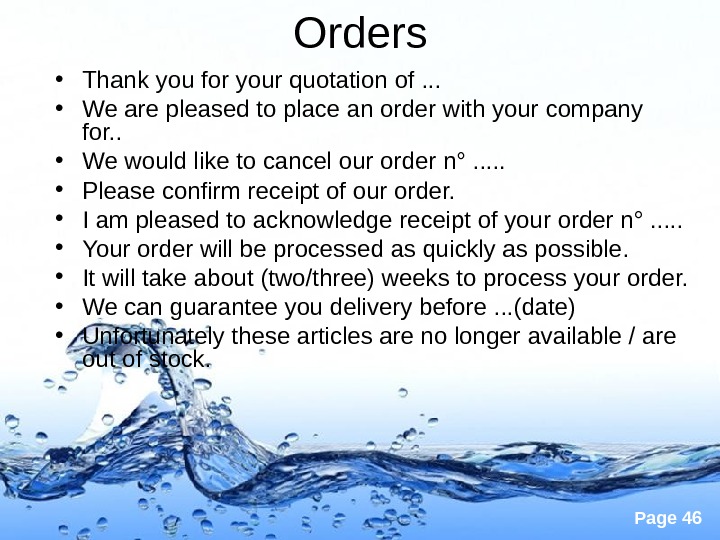
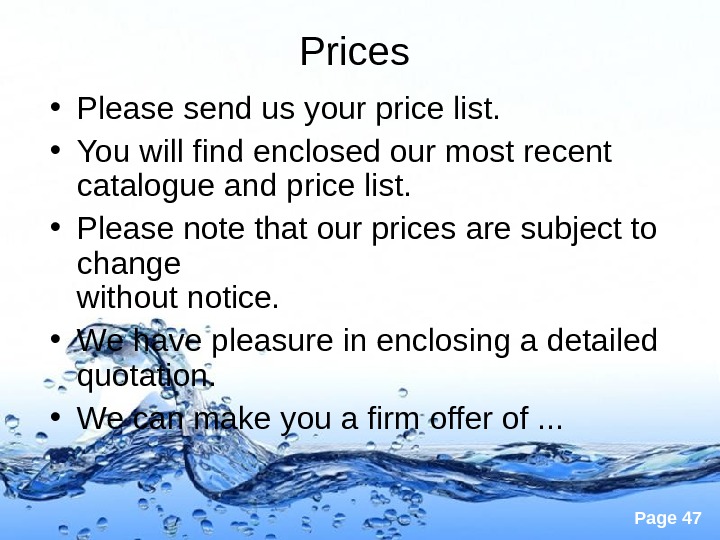
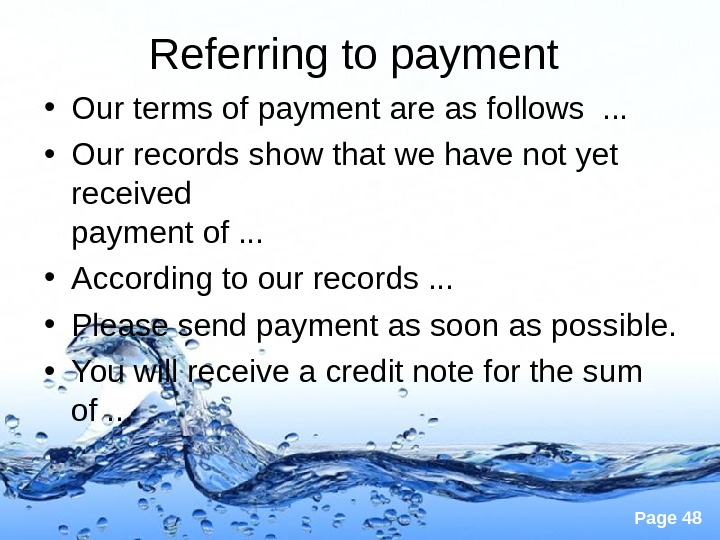
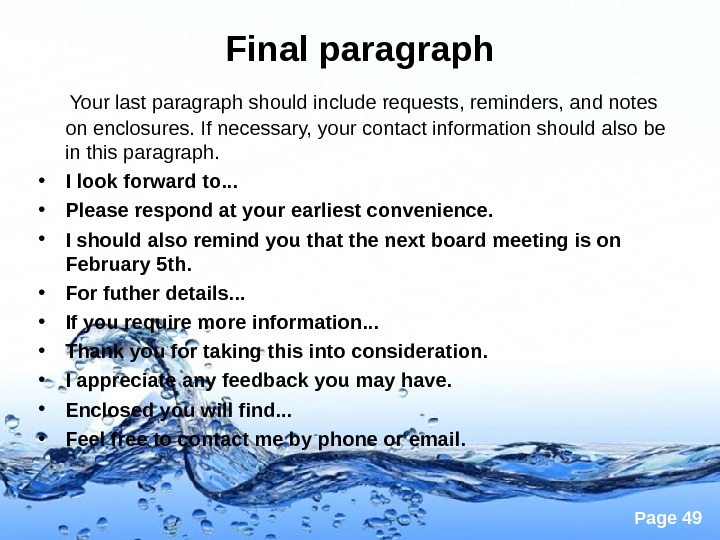
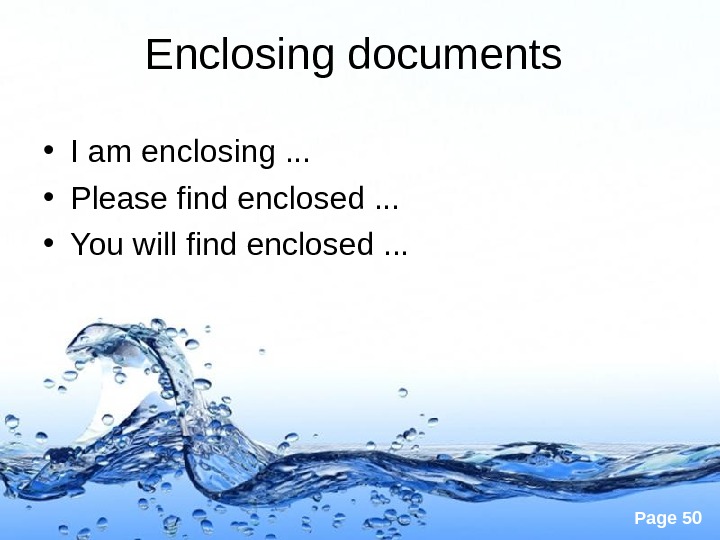
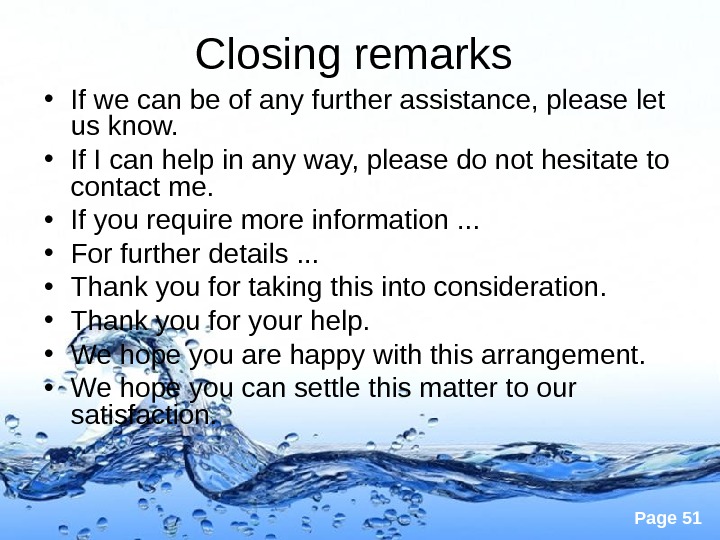
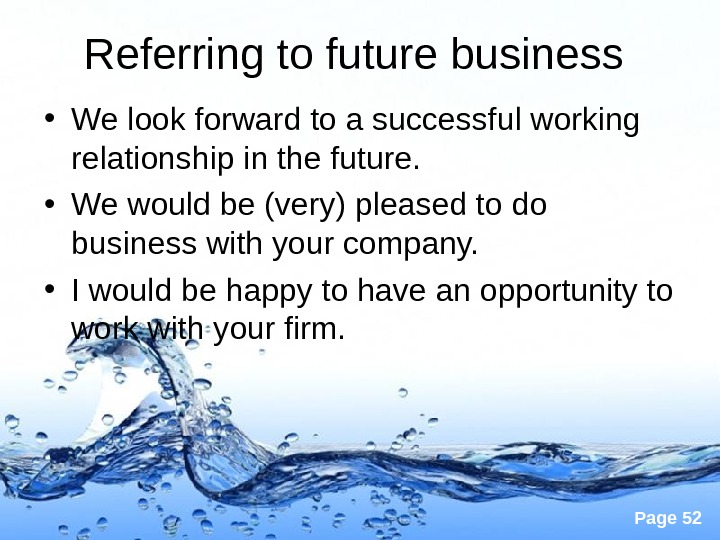
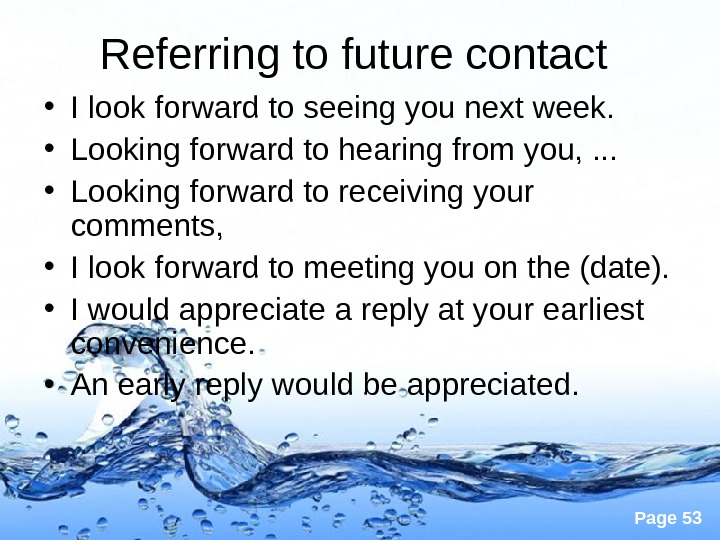
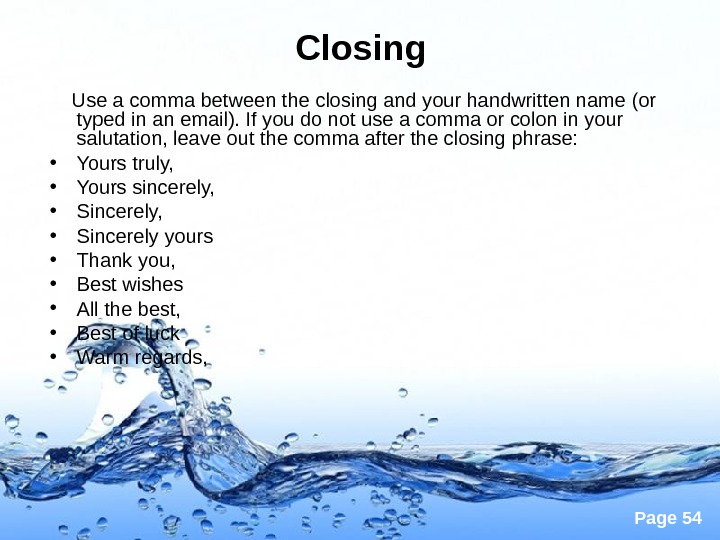
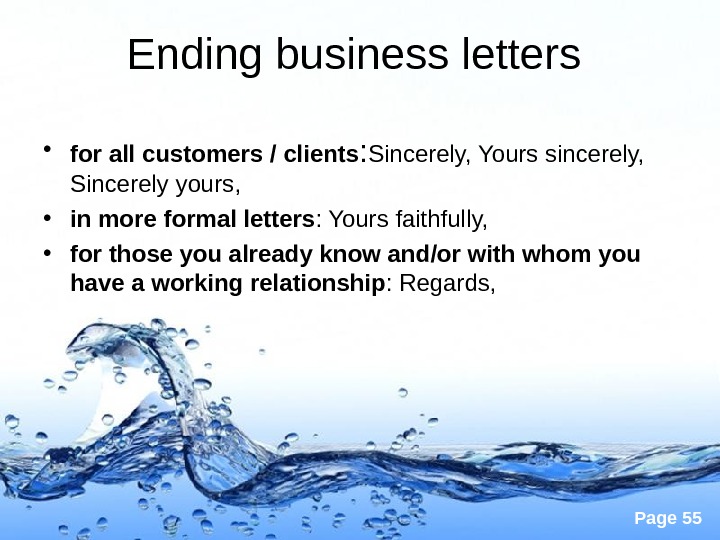
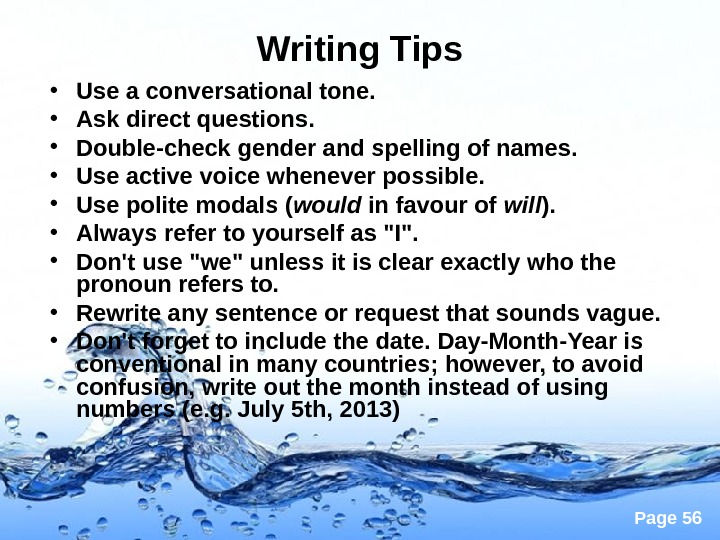
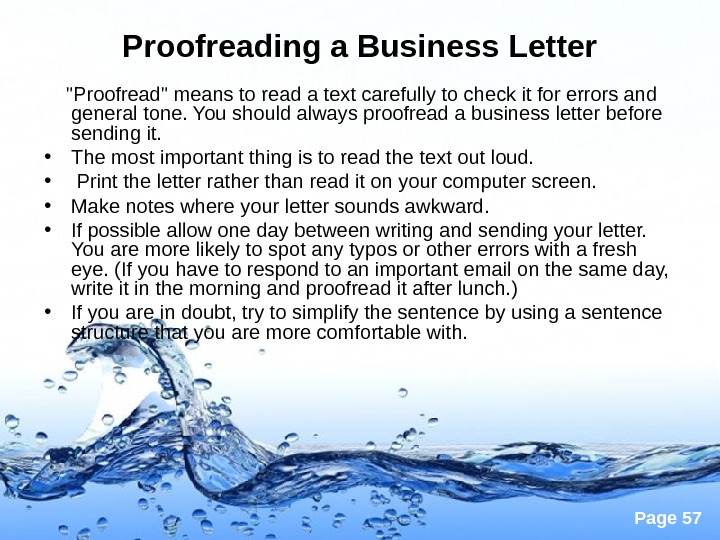
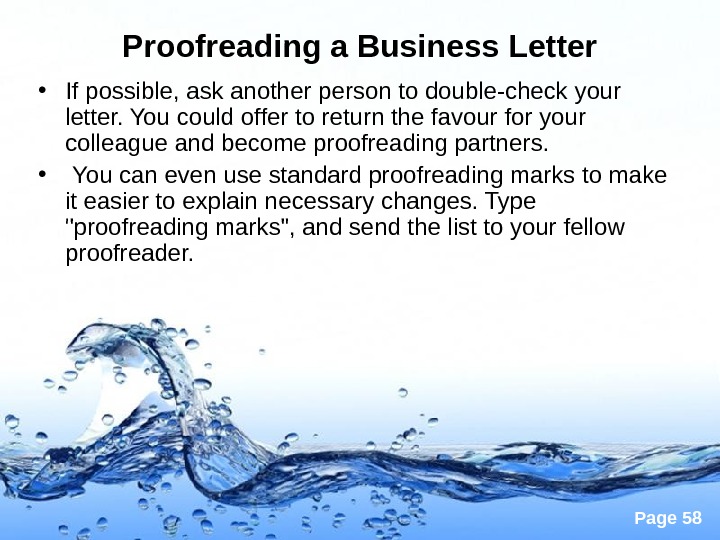

- Размер: 419.5 Кб
- Количество слайдов: 59
Описание презентации Презентация business letter formats по слайдам
 Page 1 Writing Business Letters
Page 1 Writing Business Letters
 Page 2 Letter language Effective letter language weaves conciseness , informality , and courtesy into a three-strand finished fabric: • Concise writing avoids words clutter and gets directly to the point, saving the reader time and enlivening the message. As you write and revise, guard against two kinds of wordiness: deadwood and gobbledygook.
Page 2 Letter language Effective letter language weaves conciseness , informality , and courtesy into a three-strand finished fabric: • Concise writing avoids words clutter and gets directly to the point, saving the reader time and enlivening the message. As you write and revise, guard against two kinds of wordiness: deadwood and gobbledygook.
 Page 3 Deadwood repeats the same thing or uses excess words to deliver its message. Deadwood Correction In view of the fact, that Due to the fact that because Had the effect of causing caused Would you be kind enough to Would you please I want to take this opportunity to thank you Thank you In the event that if Personally, I believe I want to make it clear that [simply state what you want known]
Page 3 Deadwood repeats the same thing or uses excess words to deliver its message. Deadwood Correction In view of the fact, that Due to the fact that because Had the effect of causing caused Would you be kind enough to Would you please I want to take this opportunity to thank you Thank you In the event that if Personally, I believe I want to make it clear that [simply state what you want known]
 Page 4 Gobbledygook uses inflated, elaborately polite expressions that make writing stiff, stuffy, and distant. Gobbledygook Correction Enclosed please find I am enclosing Pursuant to the purchase of your After buying your In accordance with the terms of your warranty Your warranty provides Reference is made herewith I am referring to The said lawnmower This lawnmower
Page 4 Gobbledygook uses inflated, elaborately polite expressions that make writing stiff, stuffy, and distant. Gobbledygook Correction Enclosed please find I am enclosing Pursuant to the purchase of your After buying your In accordance with the terms of your warranty Your warranty provides Reference is made herewith I am referring to The said lawnmower This lawnmower
 Page 5 Informal language is everyday language. Friendly and relaxed, it has the air of face-to-face conversation between writer and reader. To achieve it: • use simple words and sentence structures; • personal pronouns like I, me, you , and your are appropriate. • At the same time, though, don’t go overboard and resort to slang or overly casual expressions. Saying ‘When your guys packed my radio, you must have goofed; when I got it, it was busted’ raises questions about your seriousness.
Page 5 Informal language is everyday language. Friendly and relaxed, it has the air of face-to-face conversation between writer and reader. To achieve it: • use simple words and sentence structures; • personal pronouns like I, me, you , and your are appropriate. • At the same time, though, don’t go overboard and resort to slang or overly casual expressions. Saying ‘When your guys packed my radio, you must have goofed; when I got it, it was busted’ raises questions about your seriousness.
 Page 6 Courtesy plays a key point in helping you gain your ends. Tips to help you avoid antagonizing the reader: • Avoid insults and sarcasm. Sarcastic : Do you think you could possibly send me the correct size this time? Courteous : Would you please replace the dress with one of the correct size? • Avoid curt demands. Blunt : I want you to send me …, I need a copy of … Courteous : Would you please send me … • Avoid negative implications. Negative : I take the position that … Courteous : I think you’ll find that …
Page 6 Courtesy plays a key point in helping you gain your ends. Tips to help you avoid antagonizing the reader: • Avoid insults and sarcasm. Sarcastic : Do you think you could possibly send me the correct size this time? Courteous : Would you please replace the dress with one of the correct size? • Avoid curt demands. Blunt : I want you to send me …, I need a copy of … Courteous : Would you please send me … • Avoid negative implications. Negative : I take the position that … Courteous : I think you’ll find that …
 Page 7 Business Letter Formats some basic guidelines: • Use A 4 (European) or 8. 5 x 11 inch (North American) paper or letterhead • Use 2. 5 cm or 1 inch margins on all four sides • Use a simple font such as Times New Roman or Arial • Use 10 to 12 point font • Use a comma after the salutation (Dear Mr Bond, ) • Lay out the letter so that it fits the paper appropriately • Single space within paragraphs • Double space between paragraphs
Page 7 Business Letter Formats some basic guidelines: • Use A 4 (European) or 8. 5 x 11 inch (North American) paper or letterhead • Use 2. 5 cm or 1 inch margins on all four sides • Use a simple font such as Times New Roman or Arial • Use 10 to 12 point font • Use a comma after the salutation (Dear Mr Bond, ) • Lay out the letter so that it fits the paper appropriately • Single space within paragraphs • Double space between paragraphs
 Page 8 Business Letter Formats some basic guidelines: • Double space between last sentence and closing (Sincerely, Best wishes) • Leave three to fives spaces for a handwritten signature • cc: (meaning «copies to») comes after the typed name (if necessary) • enc: (meaning «enclosure») comes next (if necessary) • Fold in three (horizontally) before placing in the envelope • Use right ragged formatting (not justified on right side)
Page 8 Business Letter Formats some basic guidelines: • Double space between last sentence and closing (Sincerely, Best wishes) • Leave three to fives spaces for a handwritten signature • cc: (meaning «copies to») comes after the typed name (if necessary) • enc: (meaning «enclosure») comes next (if necessary) • Fold in three (horizontally) before placing in the envelope • Use right ragged formatting (not justified on right side)
 Page 9 Formatting Business Letters Block format is the most common format used in business today. With this format, nothing is centred. The sender’s address, the recipient’s address, the date and all new paragraphs begin at the left margin:
Page 9 Formatting Business Letters Block format is the most common format used in business today. With this format, nothing is centred. The sender’s address, the recipient’s address, the date and all new paragraphs begin at the left margin:
 Page 10 Formatting Business Letters Wicked Wax Co. Ltd 22 Charlton Way London, SE 10 8 QY 5 th December, 2006 Ms. Maggie Jones Angel Cosmetics Inc. 110 East 25 th Street New York, NY, 10021 USA SENDER’S ADDRESS may be printed company logo and address DATE RECIPIENT’S ADDRESS
Page 10 Formatting Business Letters Wicked Wax Co. Ltd 22 Charlton Way London, SE 10 8 QY 5 th December, 2006 Ms. Maggie Jones Angel Cosmetics Inc. 110 East 25 th Street New York, NY, 10021 USA SENDER’S ADDRESS may be printed company logo and address DATE RECIPIENT’S ADDRESS
 Page 11 Formatting Business Letters Your ref: 123 Our ref: abc Dear Ms. Jones, Forthcoming Exhibition First paragraph. . . Second paragraph. . . Third paragraph. . . RECIPIENT’S REFERENCE (IF ANY) SENDER’S REFERENCE (IF ANY) SALUTATION SUBJECT BODY OF LETTER
Page 11 Formatting Business Letters Your ref: 123 Our ref: abc Dear Ms. Jones, Forthcoming Exhibition First paragraph. . . Second paragraph. . . Third paragraph. . . RECIPIENT’S REFERENCE (IF ANY) SENDER’S REFERENCE (IF ANY) SALUTATION SUBJECT BODY OF LETTER
 Page 12 Formatting Business Letters Sincerely, Morris Howard, President cc: Brian Waldorf Enc: catalogue CLOSING SIGNATURE (HAND-WRITTEN) NAME, TITLE (TYPED) COPY TO ENCLOSUR
Page 12 Formatting Business Letters Sincerely, Morris Howard, President cc: Brian Waldorf Enc: catalogue CLOSING SIGNATURE (HAND-WRITTEN) NAME, TITLE (TYPED) COPY TO ENCLOSUR
 Page 13 Formatting Business Memos are short internal business letters, sent to other staff within the same company. A memo (or memorandum) may also be posted somewhere inside a company for all to see. In contrast to letters, memos do not usually contain salutations or closings, and may be typed or hand-written. The text portion of the memo is generally in block format. Memos should include » From», «To», «Date», «Subject» and the message itself , like this:
Page 13 Formatting Business Memos are short internal business letters, sent to other staff within the same company. A memo (or memorandum) may also be posted somewhere inside a company for all to see. In contrast to letters, memos do not usually contain salutations or closings, and may be typed or hand-written. The text portion of the memo is generally in block format. Memos should include » From», «To», «Date», «Subject» and the message itself , like this:
![Page 14 Formatting Business Memos [Company logo] Page 14 Formatting Business Memos [Company logo]](/docs//business_letter_formats_images/business_letter_formats_13.jpg) Page 14 Formatting Business Memos [Company logo] MEMORANDUM From: [name or initials] To: [name or initials] Date: Subject: [short description] Message starts here. . . Often with bullet points
Page 14 Formatting Business Memos [Company logo] MEMORANDUM From: [name or initials] To: [name or initials] Date: Subject: [short description] Message starts here. . . Often with bullet points
 Page 15 CHOCOLATE HEAVEN EMPORIUM MEMORANDUM TO: All Staff FROM: Management T. C. DATE: November 9 th, 20 — SUBJECT: STAFF CHRISTMAS PARTY
Page 15 CHOCOLATE HEAVEN EMPORIUM MEMORANDUM TO: All Staff FROM: Management T. C. DATE: November 9 th, 20 — SUBJECT: STAFF CHRISTMAS PARTY
 Page 16 It’s that time of year again. As you all know, Christmas is our busiest season of the year. Every year it is a struggle for management and supervisors to find the time and energy to organize a staff Christmas party. This year, we have decided to postpone the Christmas party until after our busy season. Party Details • Date: Second or third Saturday in January (T. B. A) • Theme: Beach • Food: Caribbean • Special events: Karaoke and belly dancing
Page 16 It’s that time of year again. As you all know, Christmas is our busiest season of the year. Every year it is a struggle for management and supervisors to find the time and energy to organize a staff Christmas party. This year, we have decided to postpone the Christmas party until after our busy season. Party Details • Date: Second or third Saturday in January (T. B. A) • Theme: Beach • Food: Caribbean • Special events: Karaoke and belly dancing
 Page 17 We apologize that the celebration will have to wait until the new year, but we guarantee that it will be worth the wait. Anyone interested in volunteering to help out with the event is encouraged to call Lucy, our events coordinator. Lucy’s cell phone number is 222 -3098. Please contact Lucy outside of business hours regarding this matter. Thank you. T. C.
Page 17 We apologize that the celebration will have to wait until the new year, but we guarantee that it will be worth the wait. Anyone interested in volunteering to help out with the event is encouraged to call Lucy, our events coordinator. Lucy’s cell phone number is 222 -3098. Please contact Lucy outside of business hours regarding this matter. Thank you. T. C.
 Page 18 Formatting Business Email : the guidelines • Choose a subject line that is simple and straightforward. Refrain from using key words that might cause an email to go into another person’s trash box. • Repeat the subject line in the body of the email, beneath the salutation (as with a letter). • Use the «cc» address line to copy more than one person with your correspondence.
Page 18 Formatting Business Email : the guidelines • Choose a subject line that is simple and straightforward. Refrain from using key words that might cause an email to go into another person’s trash box. • Repeat the subject line in the body of the email, beneath the salutation (as with a letter). • Use the «cc» address line to copy more than one person with your correspondence.
 Page 19 Formatting Business Email : the guidelines • You can request a receipt for important letters. • Instead of a signature, include your typed name, and below it include your email address, business name and address, phone and fax number, and website if appropriate. • Remember that people often print out emails, so your own email address and the subject line would be lost if you had not included them in the body of the email. • Internal electronic mail may be formatted more like a memo than a formal letter.
Page 19 Formatting Business Email : the guidelines • You can request a receipt for important letters. • Instead of a signature, include your typed name, and below it include your email address, business name and address, phone and fax number, and website if appropriate. • Remember that people often print out emails, so your own email address and the subject line would be lost if you had not included them in the body of the email. • Internal electronic mail may be formatted more like a memo than a formal letter.
 Page 20 Planning a Business Letter 1. Who am I writing this letter to? Identifying your audience always comes first. Are you writing to more than one person, to someone you don’t know, or to someone you have known for a long time? This will help you determine how formal the letter needs to be. You may need to introduce yourself briefly in the letter if the recipient does not know you. You may also need to find out the updated address and title of the recipient. This is a good time to confirm the correct spelling of first and last names.
Page 20 Planning a Business Letter 1. Who am I writing this letter to? Identifying your audience always comes first. Are you writing to more than one person, to someone you don’t know, or to someone you have known for a long time? This will help you determine how formal the letter needs to be. You may need to introduce yourself briefly in the letter if the recipient does not know you. You may also need to find out the updated address and title of the recipient. This is a good time to confirm the correct spelling of first and last names.
 Page 21 Planning a Business Letter 2. Why am I writing this letter? The main reason for the letter should be understood from the subject line and first few sentences. You may cover more than one thing in one business letter, but there will almost always be a general reason for the letter. Identify your main goal and what you hope to accomplish.
Page 21 Planning a Business Letter 2. Why am I writing this letter? The main reason for the letter should be understood from the subject line and first few sentences. You may cover more than one thing in one business letter, but there will almost always be a general reason for the letter. Identify your main goal and what you hope to accomplish.
 Page 22 Planning a Business Letter 3. Are there specific details I need to include? Gather any dates, addresses, names, prices, times or other information that you may need to include before you write your letter. Double check details rather than relying on your memory.
Page 22 Planning a Business Letter 3. Are there specific details I need to include? Gather any dates, addresses, names, prices, times or other information that you may need to include before you write your letter. Double check details rather than relying on your memory.
 Page 23 Planning a Business Letter 4. Do I require a response? Before you start writing, determine whether or not you require an action or response from the recipient. Your request or requirement should be very clear. In some cases you may even need to provide a deadline for a response. If you do require a response, how should the recipient contact you? Indicate this information clearly as well. You may want to provide more than one option, such as an email address and a phone number.
Page 23 Planning a Business Letter 4. Do I require a response? Before you start writing, determine whether or not you require an action or response from the recipient. Your request or requirement should be very clear. In some cases you may even need to provide a deadline for a response. If you do require a response, how should the recipient contact you? Indicate this information clearly as well. You may want to provide more than one option, such as an email address and a phone number.
 Page 24 Planning a Business Letter 5. How can I organize my points logically? First you would introduce yourself. Second you would state your concern or reason for writing. After the main content of your letter you would include information on how you can be contacted. The end of the letter is also a place to express gratitude, wish good-luck, or offer sympathy.
Page 24 Planning a Business Letter 5. How can I organize my points logically? First you would introduce yourself. Second you would state your concern or reason for writing. After the main content of your letter you would include information on how you can be contacted. The end of the letter is also a place to express gratitude, wish good-luck, or offer sympathy.
 Page 25 an example outline RECIPIENT • Karen Jacobson • Acquaintance (met twice before, briefly) • Title: President, The Flying Club • Address: 44 Windermere Drive, Waterloo, Ontario L
Page 25 an example outline RECIPIENT • Karen Jacobson • Acquaintance (met twice before, briefly) • Title: President, The Flying Club • Address: 44 Windermere Drive, Waterloo, Ontario L
 Page 26 an example outline REASON • To invite a board member to remain on the board for a second term. • Other members suggested that she has enjoyed this position and has been thinking about staying on. • No other volunteers have come forward to take over at the end of September.
Page 26 an example outline REASON • To invite a board member to remain on the board for a second term. • Other members suggested that she has enjoyed this position and has been thinking about staying on. • No other volunteers have come forward to take over at the end of September.
 Page 27 an example outline SPECIFIC DETAILS • If she decides to stay on she will need to be available for the national meeting on 5 November. • Board members who stay for two terms are sometimes asked to take on extra duties, such as taking minutes or hosting social events.
Page 27 an example outline SPECIFIC DETAILS • If she decides to stay on she will need to be available for the national meeting on 5 November. • Board members who stay for two terms are sometimes asked to take on extra duties, such as taking minutes or hosting social events.
 Page 28 an example outline RESPONSE • She will need to respond by 1 September. • She can contact me by email or phone.
Page 28 an example outline RESPONSE • She will need to respond by 1 September. • She can contact me by email or phone.
 Page 29 an example outline ORGANIZATION • Return address of our institution • Karen Jacobson’s title and address • Salutation: Dear Ms. Jacobson • First paragraph: Introduce myself briefly—remind Karen where we met before. Provide my reason for writing: «I have heard from a number of board members that you may be interested in staying on for a second term. We would be very pleased to have you stay on for another year. » • Second paragraph: Explain what type of commitment this position will involve this year (once a month meetings, national meeting, plus possible extra duties) • Third Paragraph: Provide deadline for response and how to contact me. • Closing: Express thanks to Karen for volunteering her time this year
Page 29 an example outline ORGANIZATION • Return address of our institution • Karen Jacobson’s title and address • Salutation: Dear Ms. Jacobson • First paragraph: Introduce myself briefly—remind Karen where we met before. Provide my reason for writing: «I have heard from a number of board members that you may be interested in staying on for a second term. We would be very pleased to have you stay on for another year. » • Second paragraph: Explain what type of commitment this position will involve this year (once a month meetings, national meeting, plus possible extra duties) • Third Paragraph: Provide deadline for response and how to contact me. • Closing: Express thanks to Karen for volunteering her time this year
 Page 30 General Guidelines • Plan before you write. – Look up words you need before you start. – Note the points you want to make, and order them into logical paragraphs. • Tone – Write as you would speak in a business conversation. The tone should be friendly and polite.
Page 30 General Guidelines • Plan before you write. – Look up words you need before you start. – Note the points you want to make, and order them into logical paragraphs. • Tone – Write as you would speak in a business conversation. The tone should be friendly and polite.
 Page 31 General Guidelines • Names – Make sure you check the gender of the addressee (the recipient), as well as the correct spelling of the person’s name and title. – Use Ms. for women and Mr. for men. You can use Mrs. for a woman if you are 100% sure that she is married. • Dates – To avoid any confusion, write the month instead of using numbers (e. g. March 15 th, 2012 or 15 March 2012).
Page 31 General Guidelines • Names – Make sure you check the gender of the addressee (the recipient), as well as the correct spelling of the person’s name and title. – Use Ms. for women and Mr. for men. You can use Mrs. for a woman if you are 100% sure that she is married. • Dates – To avoid any confusion, write the month instead of using numbers (e. g. March 15 th, 2012 or 15 March 2012).
 Page 32 General Guidelines • Be concise and clear. The easier it is to read a letter the better. – Keep sentences and paragraphs short and simple. – Use straightforward vocabulary to avoid any misunderstanding. – Ask direct questions. – Rewrite any sentence that does not seem perfectly clear. – If the recipient is not a native English-speaker, it is preferable to avoid words or expressions that are too technical or complicated
Page 32 General Guidelines • Be concise and clear. The easier it is to read a letter the better. – Keep sentences and paragraphs short and simple. – Use straightforward vocabulary to avoid any misunderstanding. – Ask direct questions. – Rewrite any sentence that does not seem perfectly clear. – If the recipient is not a native English-speaker, it is preferable to avoid words or expressions that are too technical or complicated
 Page 33 General Guidelines • Remember this word order principle – Subject – Verb — Object – Manner – Place – Time – Who Does What How Where When – Example : Mr. Brown will travel by plane to London on Monday, June 5 th. A technician will install the equipment in your office on Tuesday.
Page 33 General Guidelines • Remember this word order principle – Subject – Verb — Object – Manner – Place – Time – Who Does What How Where When – Example : Mr. Brown will travel by plane to London on Monday, June 5 th. A technician will install the equipment in your office on Tuesday.
 Page 34 General Guidelines • Avoid old-fashioned words Although they are used in legal documents and contracts, words like ‘herewith’, ‘herein’, ‘aforementioned’, etc. are rarely used in letters. The following style of sentence is preferable : «You will find more information on our products in the enclosed brochure. «
Page 34 General Guidelines • Avoid old-fashioned words Although they are used in legal documents and contracts, words like ‘herewith’, ‘herein’, ‘aforementioned’, etc. are rarely used in letters. The following style of sentence is preferable : «You will find more information on our products in the enclosed brochure. «
 Page 35 Salutation When you don’t know the name of a person and cannot find this information out you may write, «To Whom It May Concern». It is standard to use a comma (colon in North America) after the salutation. It is also possible to use no punctuation mark at all. Here are some common ways to address the recipient: • Dear Mr Powell, • Dear Ms Mackenzie, • Dear Frederick Hanson: • Dear Editor-in-Chief: • Dear Valued Customer • Dear Sir or Madam: • Dear Madam • Dear Sir, • Dear Sirs • Gentlemen:
Page 35 Salutation When you don’t know the name of a person and cannot find this information out you may write, «To Whom It May Concern». It is standard to use a comma (colon in North America) after the salutation. It is also possible to use no punctuation mark at all. Here are some common ways to address the recipient: • Dear Mr Powell, • Dear Ms Mackenzie, • Dear Frederick Hanson: • Dear Editor-in-Chief: • Dear Valued Customer • Dear Sir or Madam: • Dear Madam • Dear Sir, • Dear Sirs • Gentlemen:
 Page 36 First paragraph In most types of business letter it is common to use a friendly greeting in the first sentence of the letter. Here are some examples: • I hope you are enjoying a fine summer. • Thank you for your kind letter of January 5 th. • I came across an ad for your company in The Star today. • It was a pleasure meeting you at the conference this month. • I appreciate your patience in waiting for a response.
Page 36 First paragraph In most types of business letter it is common to use a friendly greeting in the first sentence of the letter. Here are some examples: • I hope you are enjoying a fine summer. • Thank you for your kind letter of January 5 th. • I came across an ad for your company in The Star today. • It was a pleasure meeting you at the conference this month. • I appreciate your patience in waiting for a response.
 Page 37 Referring to previous contact • Thank you for your letter of March 15. • Thank you for contacting us. • In reply to your request, . . . • Thank you for your letter regarding. . . • With reference to our telephone conversation yesterday. . . • Further to our meeting last week. . . • It was a pleasure meeting you in London last month. • I enjoyed having lunch with you last week in Tokyo. • I would just like to confirm the main points we discussed on Tuesday.
Page 37 Referring to previous contact • Thank you for your letter of March 15. • Thank you for contacting us. • In reply to your request, . . . • Thank you for your letter regarding. . . • With reference to our telephone conversation yesterday. . . • Further to our meeting last week. . . • It was a pleasure meeting you in London last month. • I enjoyed having lunch with you last week in Tokyo. • I would just like to confirm the main points we discussed on Tuesday.
 Page 38 Starting After your short opening, state the main point of your letter in one or two sentences: • We are writing to inform you that / to confirm / to request / to enquire about. . . • I am contacting you for the following reason. • I recently read/heard about. . . and would like to know. . • Having seen your advertisement in. . . , I would like to. . . • I would be interested in (obtaining / receiving). . . • I received your address from. . . and would like to. . . • I am writing to tell you about. . .
Page 38 Starting After your short opening, state the main point of your letter in one or two sentences: • We are writing to inform you that / to confirm / to request / to enquire about. . . • I am contacting you for the following reason. • I recently read/heard about. . . and would like to know. . • Having seen your advertisement in. . . , I would like to. . . • I would be interested in (obtaining / receiving). . . • I received your address from. . . and would like to. . . • I am writing to tell you about. . .
 Page 39 Second and third paragraphs Use a few short paragraphs to go into greater detail about your main point. If one paragraph is all you need, don’t write an extra paragraph just to make your letter look longer. If you are including sensitive material, such as rejecting an offer or informing an employee of a layoff period, embed this sentence in the second paragraph rather than opening with it.
Page 39 Second and third paragraphs Use a few short paragraphs to go into greater detail about your main point. If one paragraph is all you need, don’t write an extra paragraph just to make your letter look longer. If you are including sensitive material, such as rejecting an offer or informing an employee of a layoff period, embed this sentence in the second paragraph rather than opening with it.
 Page 40 Making a request • We would appreciate it if you would. . . • I would be grateful if you could. . . • Could you please send me. . . • Could you possibly tell us / let us have. . . • In addition, I would like to receive. . . • It would be helpful if you could send us. . . • I am interested in (obtaining / receiving). . . • I would appreciate your immediate attention to this matter. • Please let me know what action you propose to take.
Page 40 Making a request • We would appreciate it if you would. . . • I would be grateful if you could. . . • Could you please send me. . . • Could you possibly tell us / let us have. . . • In addition, I would like to receive. . . • It would be helpful if you could send us. . . • I am interested in (obtaining / receiving). . . • I would appreciate your immediate attention to this matter. • Please let me know what action you propose to take.
 Page 41 Offering help • Would you like us to. . . ? • We would be happy to. . . • We are quite willing to. . . • Our company would be pleased to. . .
Page 41 Offering help • Would you like us to. . . ? • We would be happy to. . . • We are quite willing to. . . • Our company would be pleased to. . .
 Page 42 Giving good news • We are pleased to announce that. . . • I am delighted in inform you that. . • You will be pleased to learn that. . .
Page 42 Giving good news • We are pleased to announce that. . . • I am delighted in inform you that. . • You will be pleased to learn that. . .
 Page 43 Giving bad news • We regret to inform you that. . . • I’m afraid it would not be possible to. . . • Unfortunately we cannot / we are unable to. . . • After careful consideration we have decided (not) to. . .
Page 43 Giving bad news • We regret to inform you that. . . • I’m afraid it would not be possible to. . . • Unfortunately we cannot / we are unable to. . . • After careful consideration we have decided (not) to. . .
 Page 44 Complaining • I am writing to express my dissatisfaction with. . . • I am writing to complain about. . . • Please note that the goods we ordered on ( date ) have not yet arrived. • We regret to inform you that our order n° —— is now considerably overdue. • I would like to query the transport charges which seem unusually high
Page 44 Complaining • I am writing to express my dissatisfaction with. . . • I am writing to complain about. . . • Please note that the goods we ordered on ( date ) have not yet arrived. • We regret to inform you that our order n° —— is now considerably overdue. • I would like to query the transport charges which seem unusually high
 Page 45 Apologizing • We are sorry for the delay in replying to. . . • I regret any inconvenience caused (by). . . • I would like to apologize for the (delay, inconvenience). . . • Once again, please accept my apologies for. . .
Page 45 Apologizing • We are sorry for the delay in replying to. . . • I regret any inconvenience caused (by). . . • I would like to apologize for the (delay, inconvenience). . . • Once again, please accept my apologies for. . .
 Page 46 Orders • Thank you for your quotation of. . . • We are pleased to place an order with your company for. . • We would like to cancel our order n°. . . • Please confirm receipt of our order. • I am pleased to acknowledge receipt of your order n°. . . • Your order will be processed as quickly as possible. • It will take about (two/three) weeks to process your order. • We can guarantee you delivery before. . . (date) • Unfortunately these articles are no longer available / are out of stock.
Page 46 Orders • Thank you for your quotation of. . . • We are pleased to place an order with your company for. . • We would like to cancel our order n°. . . • Please confirm receipt of our order. • I am pleased to acknowledge receipt of your order n°. . . • Your order will be processed as quickly as possible. • It will take about (two/three) weeks to process your order. • We can guarantee you delivery before. . . (date) • Unfortunately these articles are no longer available / are out of stock.
 Page 47 Prices • Please send us your price list. • You will find enclosed our most recent catalogue and price list. • Please note that our prices are subject to change without notice. • We have pleasure in enclosing a detailed quotation. • We can make you a firm offer of. . .
Page 47 Prices • Please send us your price list. • You will find enclosed our most recent catalogue and price list. • Please note that our prices are subject to change without notice. • We have pleasure in enclosing a detailed quotation. • We can make you a firm offer of. . .
 Page 48 Referring to payment • Our terms of payment are as follows . . . • Our records show that we have not yet received payment of. . . • According to our records. . . • Please send payment as soon as possible. • You will receive a credit note for the sum of. . .
Page 48 Referring to payment • Our terms of payment are as follows . . . • Our records show that we have not yet received payment of. . . • According to our records. . . • Please send payment as soon as possible. • You will receive a credit note for the sum of. . .
 Page 49 Final paragraph Your last paragraph should include requests, reminders, and notes on enclosures. If necessary, your contact information should also be in this paragraph. • I look forward to. . . • Please respond at your earliest convenience. • I should also remind you that the next board meeting is on February 5 th. • For futher details. . . • If you require more information. . . • Thank you for taking this into consideration. • I appreciate any feedback you may have. • Enclosed you will find. . . • Feel free to contact me by phone or email.
Page 49 Final paragraph Your last paragraph should include requests, reminders, and notes on enclosures. If necessary, your contact information should also be in this paragraph. • I look forward to. . . • Please respond at your earliest convenience. • I should also remind you that the next board meeting is on February 5 th. • For futher details. . . • If you require more information. . . • Thank you for taking this into consideration. • I appreciate any feedback you may have. • Enclosed you will find. . . • Feel free to contact me by phone or email.
 Page 50 Enclosing documents • I am enclosing. . . • Please find enclosed. . . • You will find enclosed. . .
Page 50 Enclosing documents • I am enclosing. . . • Please find enclosed. . . • You will find enclosed. . .
 Page 51 Closing remarks • If we can be of any further assistance, please let us know. • If I can help in any way, please do not hesitate to contact me. • If you require more information. . . • For further details. . . • Thank you for taking this into consideration. • Thank you for your help. • We hope you are happy with this arrangement. • We hope you can settle this matter to our satisfaction.
Page 51 Closing remarks • If we can be of any further assistance, please let us know. • If I can help in any way, please do not hesitate to contact me. • If you require more information. . . • For further details. . . • Thank you for taking this into consideration. • Thank you for your help. • We hope you are happy with this arrangement. • We hope you can settle this matter to our satisfaction.
 Page 52 Referring to future business • We look forward to a successful working relationship in the future. • We would be (very) pleased to do business with your company. • I would be happy to have an opportunity to work with your firm.
Page 52 Referring to future business • We look forward to a successful working relationship in the future. • We would be (very) pleased to do business with your company. • I would be happy to have an opportunity to work with your firm.
 Page 53 Referring to future contact • I look forward to seeing you next week. • Looking forward to hearing from you, . . . • Looking forward to receiving your comments, • I look forward to meeting you on the (date). • I would appreciate a reply at your earliest convenience. • An early reply would be appreciated.
Page 53 Referring to future contact • I look forward to seeing you next week. • Looking forward to hearing from you, . . . • Looking forward to receiving your comments, • I look forward to meeting you on the (date). • I would appreciate a reply at your earliest convenience. • An early reply would be appreciated.
 Page 54 Closing Use a comma between the closing and your handwritten name (or typed in an email). If you do not use a comma or colon in your salutation, leave out the comma after the closing phrase: • Yours truly, • Yours sincerely, • Sincerely yours • Thank you, • Best wishes • All the best, • Best of luck • Warm regards,
Page 54 Closing Use a comma between the closing and your handwritten name (or typed in an email). If you do not use a comma or colon in your salutation, leave out the comma after the closing phrase: • Yours truly, • Yours sincerely, • Sincerely yours • Thank you, • Best wishes • All the best, • Best of luck • Warm regards,
 Page 55 Ending business letters • for all customers / clients : Sincerely, Yours sincerely, Sincerely yours, • in more formal letters : Yours faithfully, • for those you already know and/or with whom you have a working relationship : Regards,
Page 55 Ending business letters • for all customers / clients : Sincerely, Yours sincerely, Sincerely yours, • in more formal letters : Yours faithfully, • for those you already know and/or with whom you have a working relationship : Regards,
 Page 56 Writing Tips • Use a conversational tone. • Ask direct questions. • Double-check gender and spelling of names. • Use active voice whenever possible. • Use polite modals ( would in favour of will ). • Always refer to yourself as «I». • Don’t use «we» unless it is clear exactly who the pronoun refers to. • Rewrite any sentence or request that sounds vague. • Don’t forget to include the date. Day-Month-Year is conventional in many countries; however, to avoid confusion, write out the month instead of using numbers (e. g. July 5 th, 2013)
Page 56 Writing Tips • Use a conversational tone. • Ask direct questions. • Double-check gender and spelling of names. • Use active voice whenever possible. • Use polite modals ( would in favour of will ). • Always refer to yourself as «I». • Don’t use «we» unless it is clear exactly who the pronoun refers to. • Rewrite any sentence or request that sounds vague. • Don’t forget to include the date. Day-Month-Year is conventional in many countries; however, to avoid confusion, write out the month instead of using numbers (e. g. July 5 th, 2013)
 Page 57 Proofreading a Business Letter «Proofread» means to read a text carefully to check it for errors and general tone. You should always proofread a business letter before sending it. • The most important thing is to read the text out loud. • Print the letter rather than read it on your computer screen. • Make notes where your letter sounds awkward. • If possible allow one day between writing and sending your letter. You are more likely to spot any typos or other errors with a fresh eye. (If you have to respond to an important email on the same day, write it in the morning and proofread it after lunch. ) • If you are in doubt, try to simplify the sentence by using a sentence structure that you are more comfortable with.
Page 57 Proofreading a Business Letter «Proofread» means to read a text carefully to check it for errors and general tone. You should always proofread a business letter before sending it. • The most important thing is to read the text out loud. • Print the letter rather than read it on your computer screen. • Make notes where your letter sounds awkward. • If possible allow one day between writing and sending your letter. You are more likely to spot any typos or other errors with a fresh eye. (If you have to respond to an important email on the same day, write it in the morning and proofread it after lunch. ) • If you are in doubt, try to simplify the sentence by using a sentence structure that you are more comfortable with.
 Page 58 Proofreading a Business Letter • If possible, ask another person to double-check your letter. You could offer to return the favour for your colleague and become proofreading partners. • You can even use standard proofreading marks to make it easier to explain necessary changes. Type «proofreading marks», and send the list to your fellow proofreader.
Page 58 Proofreading a Business Letter • If possible, ask another person to double-check your letter. You could offer to return the favour for your colleague and become proofreading partners. • You can even use standard proofreading marks to make it easier to explain necessary changes. Type «proofreading marks», and send the list to your fellow proofreader.
 Page
Page

